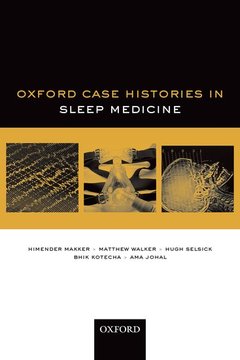Description
Oxford Case Histories in Sleep Medicine
Oxford Case Histories Series
Authors: Makker Himender, Walker Matthew, Selsick Hugh, Kotecha Bhik, Johal Ama
Language: English
Subjects for Oxford Case Histories in Sleep Medicine:
85.25 €
In Print (Delivery period: 21 days).
Add to cart
Publication date: 03-2015
400 p. · 16.1x23.4 cm · Paperback
400 p. · 16.1x23.4 cm · Paperback
Description
/li>Biography
/li>
This book provides a case-based illustrative approach to the understanding and management of common and important sleep disorders, including snoring and sleep disordered breathing, insomnia and circadian-rhythm disorders, as well as primary neurological sleep disorders. Case histories are written by well-established experts from University College London Hospitals who have long-standing experience of providing a multi-disciplinary approach to the management of sleep disorders. Cases focus on the recognition of presenting features of sleep disorders and their clinical importance, using real life patients from sleep clinic. Each case report provides a detailed clinical description followed by a clear explanation of the salient points. The text is supported by photographs, diagrams and line drawing and concludes with a list of key learning points. Each case history reads as stand-alone, although a common theme of presenting features, clinical features, investigation and treatment is adhered to. Cases are written in an easy-flowing prose style in an attempt to simulate the experience of seeing and discussing a real life patient case in clinical practice. The book is of interest to all clinicians who are likely to come across patients with sleep disorders in their clinical practice and wish to improve their understanding and knowledge of sleep disorders.
Dr Himender Makker is a Consultant Respiratory Physician with a special interest in sleep apnoea. He developed interest in sleep medicine while working as a Senior Registrar at the Birmingham Heartlands Hospital (1995-1997). On his appointment as a Consultant at UCLH in 1997, he developed a sleep service and established protocols and guidelines for the management of sleep apnoea. He created sleep research group in collaboration with neuropsychologists and medical physicists to investigate neuropsychological impairment in sleep apnoea. The research was funded by the CDRC grant, presented at the conferences, published in peer review journals, and contributed to MD of a research fellow. He organises and teaches at sleep apnoea the NE Thames Respiratory SpRs study days and the UCLH sleep apnoea course. He has a wider experience of raising awareness of sleep-disordered breathing through writing articles for the local newspaper and health magazines, and interview/talks on Radio and TV. Prof Matthew Walker graduated from Cambridge University and St Thomas' Hospital in 1989, and is now Professor of Neurology at the Institute of Neurology, UCL and Consultant Neurologist at the National Hospital for Neurology and Neurosurgery. He specializes in epilepsy, neurological sleep disorders, and video-EEG telemetry. In addition, he has an active research laboratory investigating synaptic physiology and epilepsy. He is also associate editor of Epilepsia and Therapeutic Advances in Neurological Disorders, an executive member of the Joint Epilepsy Council of Great Britain and Ireland and a council member of the UK chapter of the ILAE. Dr Hugh Selsick graduated with a BSc in Physiology, a BSc Honours in Experimental Physiology and MBBCh at the University of the Witwatersrand, Johannesburg. He is the lead consultant psychiatrist at the Insomnia Clinic in the Royal London Hospital for Integrated Medicine/University College London Hospitals and also works as a consultant in sleep medicine
© 2024 LAVOISIER S.A.S.
These books may interest you

Sleep Medicine and Mental HealthA Guide for Psychiatrists and Other Healthcare Professionals 105.49 €

Sleep Medicine and Mental HealthA Guide for Psychiatrists and Other Healthcare Professionals 105.49 €

Sleep Medicine in Neurology 91.77 €

